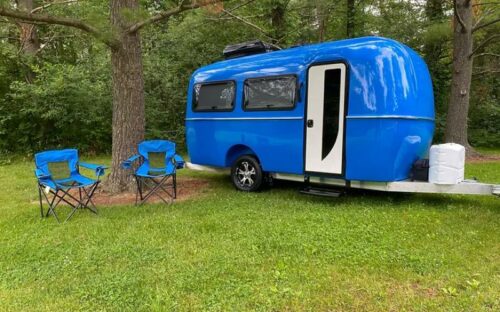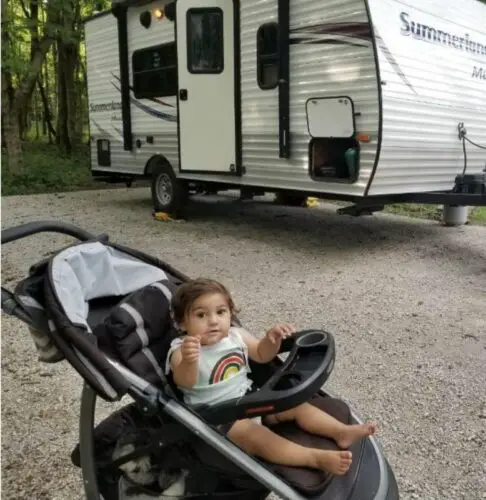
For federal tax purposes, yes, an RV can be claimed as a second home. In fact, you can even claim an RV as your primary residence! Motorhomes, 5th wheels, vans, truck campers, travel trailers – even pop-up campers – are all eligible.
But like any tax topic, fine print abounds. Just because you can doesn’t mean you should. And just because you should doesn’t mean you can claim all expenses.
Stop! Does This Question Apply to You?
Before you go any further – I know how valuable your time is, so I want to be honest:
Due to a loophole in the 2017 TCAJ amendment, towable RVs are excluded from these tax breaks. That means travel trailers, 5th wheels, toy haulers, pop-ups, and truck campers are NOT eligible for any tax deductions. (Crummy, isn’t it? The RVIA is heavily lobbying for a revision to the tax law.)
But if you own a self-propelled RV, such as a Class A coach, Class C motorhome, or Class B van, then continue!
Secondly, if you claim the standard deduction, there probably aren’t any tax deductions available to you for purchasing an RV.
RVs, like motorhomes and trailers, are considered “luxury purchases.” The IRS isn’t going out of its way to encourage you to splurge on your hobbies.
However, if you itemize your deductions, then continue reading! You might be pleasantly surprised.
(Lastly, this post does NOT own the question of claiming your RV as a permanent domicile. That’s a thornier issue. Read more about it here.)
Why Would I Want to Claim My RV as a Second Home?
1. Mortgage Interest Deduction
If you claim an RV as your primary or secondary residence, you can claim a mortgage interest deduction on your tax return.
“Under the U.S. tax code, RV buyers can deduct the interest on certain loans used to purchase RVs as a mortgage on a second home. RVs qualify for a second home mortgage interest deduction because they are a popular weekend and vacation ‘home’ for middle-class Americans.”
This tax benefit is called second home mortgage interest deduction.
However … per the 2017 Tax Cuts and Jobs Act, you can deduct the interest on up to $750,000 in acquisition debt and $1.1 million in total listed properties. If you own high-value residential property, then double-check with your accountant; you may have already maxed out your interest deduction.
2. Flexible Financing
If you claim the motorhome as your residence on your financing contract, the financial institution may grant you longer loan terms – up to 20 years!
3. Homeowner’s Insurance
Here’s a cool perk: If you claim your RV as a home, you might be able to get homeowner’s insurance for it!
Compared to typical RV insurance, homeowner’s insurance is much more comprehensive, including coverage for interior damage, exterior damage, loss or damage of personal assets/belongings, and injury that arises while on the insured property.
You may even be able to bundle your “RV” homeowner’s insurance and brick n’ mortar house insurance into one policy!
(P.S. Make this decision carefully! If you claim your motorhome as a second home, you can be assessed capital gains taxes when you sell it.)
Does an RV Qualify as a Second Home?
The Internal Revenue Service (IRS) has very broad constraints on the definition of a home. Per IRS Publication 936:
“A home includes a house, condominium, cooperative, mobile home, house trailer, boat, or similar property that has sleeping, cooking, and toilet facilities.”
Did you catch that?
The IRS allows any of the following to be claimed as residential property:
- House
- Condominium
- Apartment
- Cooperative
- Mobile Home
- House Trailer
- RV
- Boat
Any of these properties can be claimed as a primary or secondary residence so long as they pass this three-part test:
- Sleeping area
- Kitchen cooking area
- Bathroom and toilet facilities
There are no size requirements for a home. In short, the IRS has fewer stipulations for your home than your Homeowner’s Association.
That casts a pretty big net! Unless you’re towing something like a teardrop trailer or expedition trailer, chances are, your RV qualifies as a home for tax purposes.
What If I Didn’t Finance My RV Purchase?
It’s a common mistake to think that the purchase price of an RV is deductible. That’s not true! The only deductible portion is the interest charged.
So if you bought your RV with cash or check – sorry! There is no deductible interest portion of your purchase.
What if you used a personal loan? Sorry again! The financing must be a secured loan with the RV or your primary home as collateral. In other words, you have to finance your RV purchase. You can’t use a personal or P2P loan, which are A) either unsecured or B) secured with an unrelated collateral (e.g. your personal vehicle).
(However, depending on your state laws, you may be able to take advantage of the sales tax deduction! This is most useful if you live in a state with no income taxes, such as Alaska, Florida, Nevada, South Dakota, Tennessee, Texas, Washington and Wyoming.)
Can I Claim a Used RV as a Second Home?
Yes, you can. There is no stipulation that your RV “home” must be new – or any age range!
However, see the previous constraint! If you purchase a used RV, you still have to finance it with a secured loan to take advantage of the interest tax deduction.
Can I Claim Multiple Second Homes?
The IRS allows you to choose only one home as a primary residence at any one time. By definition, your primary residence must be where you ordinarily reside. And it should be within the state in which you declare residency.
So while you can claim your RV as a primary or secondary residence, you must choose one or the other. And you can only have one secondary residence. Even if you own multiple RVs or vacation homes, you may only choose a single primary and a single secondary residence.
You can designate a different primary or secondary residence at any time throughout the year. But this will have major tax implications if you are claiming deductions related to these properties.
Can I Claim My RV on Taxes Even if I Rent It Out?
Can you claim the mortgage interest deduction if you rent out your RV?
You’ll have to meet another condition: you must dwell in your RV for a minimum amount of time. You either have to live in a rented-out RV for more than two weeks or more than 10% of the total rental days, whichever is longer.
If you don’t fulfill that stipulation, then you are using your RV as an income-generating asset, an investment property, not a residential home. Different tax rules apply, and you cannot claim the mortgage interest as a deduction.
If you are NOT renting out your RV, then there is no dwelling obligation. You don’t have to prove you even used the RV. So long as you own it, you can claim it.
Andy Herrick is a blogging nerd, #8 Enneagram, wannabe bread baker, INTJ, RV industry professional, and small business entrepreneur. He can be found hanging out with his lovely wife and family, skiing, cycling, climbing, hiking, and convincing anyone who will listen why dogs aren’t really that great of pets. Also, he runs this website.










